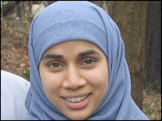 Marking the end of three months of intense lobbying and painstaking efforts to make their voice heard and gain the support of Members of the European Parliament, Protect Hijab activists see the campaign a “success” and “positive step”.
Marking the end of three months of intense lobbying and painstaking efforts to make their voice heard and gain the support of Members of the European Parliament, Protect Hijab activists see the campaign a “success” and “positive step”.
“If we look at the number of Written Declarations (WDs) that have been put before the European Parliament this year, from eight WDs only two got more signatories than ours,” Vice-Coordinator of the London-based Assembly for the Protection of Hijab (Protect Hijab), Rajnaara Akhtar, told IslamOnline.net Tuesday, May 24.
She was referring to a Written Declaration on Religious Rights and Freedoms, which was tabled by Protect Hijab and MEPs to the parliament February 21 as a preliminary step towards a binding resolution obliging European countries, particularly France, to lift ban on hijab in state-run institutions like schools.
“If we look at the picture that way, it (the hijab campaign) has been definitely a success. It is a first step we have to build on it, considering it was the first WD we put forward and collected that number of signatures which reached 70 in total. So we do think that it was a positive thing,” Akhtar told IOL by phone from London.
Akhtar added pro-hijab activists met in London Saturday, May 21, to celebrate the achievement over the past three months. “We also met Wednesday [May 18] in front of the Strasbourg-based European Parliament and were shared the moment by MEPs,” she said.
The WD was initially drafted by British MEPs Caroline Lucas (Green Party), amended by Sarah Ludford (Liberal Democrats), and then translated into 22 languages spoken across Europe.
Chief among the signatories are French Alain Lipietz, Polish Bogusław Rogalski, German Frau Gisela Kallenbach, Hungarian Kinga Gál, Italian Luisa Morgantini, Spanish Raül Romeva i Rueda, Finnish Eija-Riitta Korhola, Latvian Tatjana Zdanoka, Danish Hr. Neils Busk, Dutch Maria Martens, Eistonian Siiri Oviir, according to Protect Hijab Web site.
“Now we have many friends inside the European Parliament and will continue to engage with them and share ideas with them,” Akhtar added. “More politicians are aware of the campaign as we encourage them to think about the key issue of religious tolerance in Europe.”
